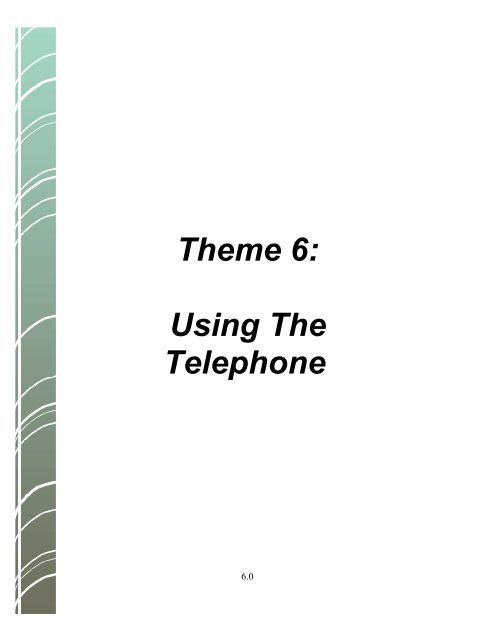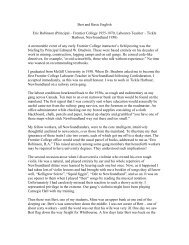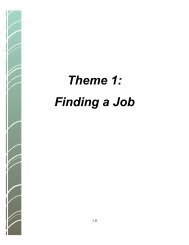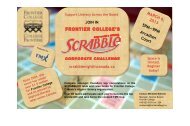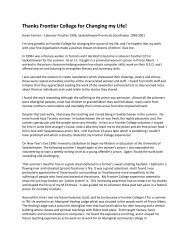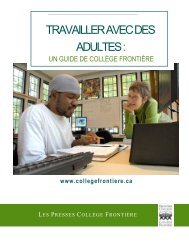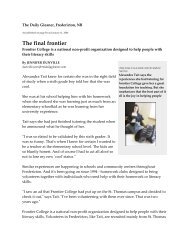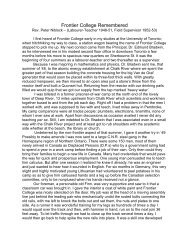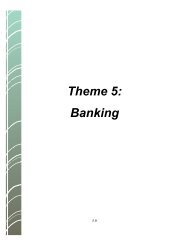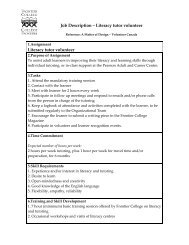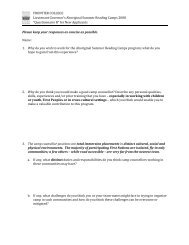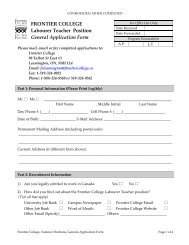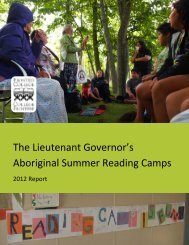Theme 6: Using The Telephone - Frontier College
Theme 6: Using The Telephone - Frontier College
Theme 6: Using The Telephone - Frontier College
You also want an ePaper? Increase the reach of your titles
YUMPU automatically turns print PDFs into web optimized ePapers that Google loves.
<strong><strong>The</strong>me</strong> 6:<br />
<strong>Using</strong> <strong>The</strong><br />
<strong>Telephone</strong><br />
6.0
Unit 1: <strong>Telephone</strong> Fears<br />
<strong><strong>The</strong>me</strong>: <strong>Using</strong> the <strong>Telephone</strong><br />
Initial Assessment:<br />
What does the student know, what does she need to know?<br />
1. What do you find the most difficult about using the telephone?<br />
2. What type of phone call do you find the most difficult to handle?<br />
3. What type of phone calls do you make? (business, personal, employment)<br />
4. What things make it difficult for you to understand during a telephone<br />
conversation?<br />
5. Do you feel comfortable asking for clarification on the telephone?<br />
6. Do you feel comfortable asking someone to repeat information?<br />
7. Do you feel comfortable asking someone to slow down when they are speaking<br />
too quickly?<br />
8. Do you feel comfortable asking someone to spell their name or address?<br />
6.1
Expected Outcomes:<br />
In this unit students will:<br />
# express their concerns about the use of the telephone<br />
# feel more comfortable using the telephone<br />
# expand their skills in the use of the telephone<br />
# further develop their vocabulary related to telephone calls<br />
Tools:<br />
For this unit you will need:<br />
# pen/pencil<br />
# paper<br />
# index cards<br />
6.2
Activity Procedures:<br />
Activity One:<br />
# tutor relates the following story:<br />
“ I am really upset. Last night, just as I was sitting down to dinner my phone<br />
rang. I answered it. It was a young lady and she kept talking and talking. She<br />
talked so quickly I could hardly understand what she was saying. After about<br />
five minutes I realized that she was selling magazines. I told her I wasn’t<br />
interested and hung up.”<br />
# afer you have related the story, ask your student when she has been upset at a<br />
phone call<br />
# ask her what caused her to be upset and why?<br />
# record her answers<br />
# once you have recorded her answers, ask her what the other person could have<br />
done to make the phone call more pleasant and understandable<br />
Activity Two:<br />
# discuss the words in the Key Vocabulary List<br />
# clarify any words that pose a problem<br />
# ask your student to use each one in a sentence related to using the telephone<br />
e.g., You need to speak loudly when you talk on the telephone.<br />
6.3
Demonstrators:<br />
How do I know that my student has understood what we have been working on and<br />
can he do it independently?<br />
Demonstrative Activities:<br />
1. _________________ feels more comfortable answering the telephone.<br />
Student’s Name Tutor’s Initials: ________ Date: ________<br />
2. _________________ is able to identify difficulties around using the telephone.<br />
Tutor’s Initials: ________ Date: ________<br />
3. ______________ is able to handle telephone calls from telemarketers.<br />
Student’s Name Tutor’s Initials:________ Date:________<br />
4. _____________ has further developed vocabulary related to answering<br />
telephone calls. Tutor’s Initials:________ Date:________<br />
6.4
Background Notes:<br />
Activity One:<br />
# the goal of this activity is to help your student identify difficulties that she has<br />
in dealing with phone calls<br />
# this activity should also help your student realize that the other person may also<br />
be partially responsible for her not totally understanding the conversation e.g.,<br />
the other person spoke far too quickly<br />
Activity Two:<br />
# ask your student to match synonyms (words with similar meanings (e.g., softly,<br />
quietly)<br />
# use a thesaurus to locate other synonyms<br />
# another activity would be to discuss root words, prefixes and suffixes e.g.,<br />
unclear - clear = root word un = prefix<br />
# discuss the meanings of various prefixes and suffixes e.g., un = not<br />
6.5
Key Vocabulary:<br />
loudly<br />
selling<br />
wrong number<br />
rude<br />
softly<br />
quietly<br />
tone<br />
quickly<br />
fast<br />
telephone solicitation<br />
telemarketing<br />
pressure<br />
nuclear<br />
rapidly<br />
vocabulary<br />
choice of words<br />
unclear<br />
clarify<br />
clarification<br />
repeatedly<br />
6.6
<strong><strong>The</strong>me</strong>: <strong>Using</strong> the <strong>Telephone</strong><br />
Unit 2: <strong>Telephone</strong> Expressions<br />
What does my student know and what does she need to know?<br />
Initial Assessment:<br />
1. What do you say when you answer your telephone?<br />
2. Who answers your telephone at home?<br />
3. What do you say/do if you reach a wrong number?<br />
4. How do you find out if you have written the number down incorrectly or<br />
whether you have dialed it incorrectly?<br />
5. What phrases can you use to let someone know you are listening?<br />
6. When do you use 911?<br />
7. What information do you give when you call 911?<br />
8. What do you say if you did not understand something someone has said to you<br />
in a telephone conversation?<br />
6.7
Expected Outcomes:<br />
In this unit students will:<br />
# understand common expressions used in everyday situations related to using<br />
the telephone<br />
# be familiar with and use everyday telephone expressions<br />
# feel more comfortable about answering the telephone<br />
# be able to ask for clarification when using the telephone<br />
# have further developed vocabulary related to using the telephone<br />
Tools:<br />
For this unit you will need:<br />
# Handouts: <strong>Telephone</strong> Expressions<br />
<strong>Telephone</strong> Etiquette<br />
# pen/pencil<br />
# paper<br />
# index cards<br />
6.8
Activity Procedures:<br />
Activity One:<br />
# ask your student to read the Key Vocabulary List<br />
# have her underline any vocabulary she is unsure of (either pronunciation or<br />
meaning<br />
# ask her to read the word aloud and use it in a sentence<br />
# have her write the word and sentence on an index card for her word bank<br />
Activity Two: Handout: <strong>Telephone</strong> Etiquette<br />
# ask your student to read the handout, <strong>Telephone</strong> Etiquette, and underline any<br />
vocabulary she is unsure of<br />
# take turns reading each of the points and discuss each point<br />
# clarify any questions<br />
# develop a set of questions related to the handout e.g., What is the emergency<br />
number? - When do you use 911?<br />
Activity Three: Handout: <strong>Telephone</strong> Expressions<br />
# ask your student to read the handout, <strong>Telephone</strong> Expressions<br />
# discuss the meaning and use of each expression<br />
# ask your student if she has heard any other expressions or phrases and add<br />
these to the list<br />
# discuss the difference between formal and informal speech and when each is<br />
used<br />
# have your student label each expression as formal or informal<br />
Activity Four:<br />
# using the phrases from Activity Three, have your student create different<br />
telephone dialogues.<br />
Activity Five:<br />
# role-play the dialogues created in Activity Four<br />
6.9
Demonstrators<br />
(How do I know that my student has understood what we have been working on and<br />
can she do it independently? )<br />
Demonstrative Activities:<br />
1. ______________ can understand commonly used expressions in everyday<br />
situations when using the telephone.<br />
Tutor’s Initials:_______ Date:________<br />
2. _____________ feels more comfortable about using the telephone.<br />
Student’s name Tutor’s Initials:_______ Date:________<br />
3. ____________ knows the emergency telephone number.<br />
Student’s name Tutor’s Initials:_______ Date:________<br />
4. ___________ knows when to use 911 and when to call directly to the station.<br />
Student’s name Tutor’s Initials:_______ Date:________<br />
5. ________________ feels more comfortable asking for clarification.<br />
Student’s name Tutor’s Initials:_______ Date:________<br />
6. ____________ knows some or all vocabulary related to answering the<br />
telephone. Tutor’s Initials:_______ Date:________<br />
6.10
Background Notes:<br />
Activity One:<br />
# by asking a student to read the word aloud and using it in a sentence, you will<br />
be able to see if your student understands the meaning of the word and if there<br />
are any pronunciation difficulties<br />
# review the vocabulary before beginning the other activities, this will help your<br />
student to understand the handouts at the end of the unit<br />
Activity Two:<br />
# Example of Questions<br />
What is a residential phone?<br />
Who answers a business phone?<br />
Why should you not provide your name and number to an unidentified caller?<br />
How do you check to see if you have dialed the wrong number?<br />
Activity Three:<br />
# note any pronunciation difficulties with words and phrases<br />
# use the phrases later in a role-play to allow your student to practice these<br />
phrases<br />
Activity Four:<br />
# Sample Dialogue<br />
A: Hello<br />
B: Hello. May I speak with Mr James please?<br />
A: He’s on the other line right now. May I take a message?<br />
B: No, thank you. I’ll call again later<br />
A: Thank you. Good-bye.<br />
B Good-bye.<br />
Activity Five:<br />
# reverse the parts as you role play<br />
# once you have role-played using the dialogues, role-play scenarios without the<br />
script<br />
6.11
Key Vocabulary<br />
acknowledge<br />
repeating<br />
social call<br />
formal<br />
informal<br />
common<br />
expressions<br />
extensions<br />
line<br />
hold<br />
apologize<br />
mis-dialed<br />
wrong number<br />
party<br />
verification<br />
requires<br />
acknowledgment<br />
pauses<br />
uh-huh<br />
uh-uh<br />
unnerve, nervous<br />
telephone solicitation<br />
hang up<br />
unfamiliar<br />
annoying<br />
nature of the call<br />
residential phones<br />
business phones<br />
inquiries<br />
severe<br />
I’m sorry<br />
6.12
Handout: <strong>Telephone</strong> Expressions<br />
Hello<br />
Hi<br />
Speaking<br />
This is she.<br />
This is he.<br />
He’s on another line right now.<br />
You can reach her at_________.<br />
She’s not here right now.<br />
He’s just stepped out.<br />
Her extension number is 24.<br />
Could you give me some information on . . . ?<br />
Could you tell me about . . . ?<br />
Thank you.<br />
Would you like to hold?<br />
Can I get him to call you back?<br />
Would you like to leave a message?<br />
She’s not in right now. Would you like her voice mail?<br />
Could you hold please?<br />
Could you repeat that please?<br />
6.13
Would you mind repeating that?<br />
How do you spell that?<br />
I’m sorry I didn’t quite get that. Could you repeat that please?<br />
I’m having difficulty hearing you, could you speak louder please?<br />
May I speak to..?<br />
May I speak with...?<br />
Good-bye.<br />
Bye<br />
Bye-bye<br />
May I take a message?<br />
Talk to you later.<br />
Certainly.<br />
Are you busy right now?<br />
He’s busy at this moment?<br />
He’s not in today.<br />
She’s not at her desk right now.<br />
I’m sorry.<br />
6.14
Handout: <strong>Telephone</strong> Etiquette<br />
< Residential telephones are answered with a simple “Hello”.<br />
< Business phones are answered by a receptionist who states the name of the<br />
company, business or organization.<br />
< When calling, ask for the person you wish to speak to or state the reason for<br />
your call, e.g. “Is Tony there, please?”<br />
< Do not demand, “Who is this?” when you call a home or business, especially<br />
when you have not identified yourself.<br />
< If you reach a wrong number, apologize.<br />
< If you are not sure if you have mis -dialed a number or whether you have<br />
written the number down incorrectly, check the number with the party you<br />
have reached by saying “ Is this 491-7623?”<br />
< Do not ask, “What number is this?”<br />
< Another way to ask is “I’m trying to reach John Smith at 769-2345. Have I got<br />
the correct number?”<br />
< Do not identify yourself to an unknown caller.<br />
< Never give personal information over the telephone.<br />
< Sometimes, dishonest people use the telephone to find out if there is anyone at<br />
home or to get a credit card number.<br />
< When calling for information, state the nature of the call and ask for the right<br />
person before going into detail.<br />
< If someone is providing information or explaining something, be sure to<br />
acknowledge you are listening. Do this during the speaker’s pauses.<br />
< Uh-uh is a negative response meaning “no”.<br />
< Uh-huh is positive response meaning “yes”.<br />
6.15
If you are silent for too long, you will make the speaker nervous and they will<br />
usually ask, “Are you still there?”<br />
< 911 is used only for emergency situations e.g., fire, severe accidents (heart<br />
attacks, bleeding, no breathing).<br />
< Do not call 911 for information.<br />
< Police divisions have a number for general inquiries.<br />
< When calling 911 give your address first.<br />
< Keep emergency numbers beside your phone.<br />
< If an answering machine takes your call, speak clearly, slowly and loudly, leave<br />
your name, telephone number and a brief message.<br />
6.16
<strong><strong>The</strong>me</strong>: <strong>Using</strong> the <strong>Telephone</strong><br />
Unit 3: Spelling Names and Addresses<br />
Initial Assessment:<br />
What does my student know and what does she need to know?<br />
1. What presents the most difficulty for you when you are spelling your name to<br />
someone on the phone?<br />
2. Do you often get mail with your name misspelled?<br />
3. What do you do if you get something and your name is misspelled?<br />
4. How would you pronounce Z ? (Show student the letter)<br />
5. What letters in your name often get confused?<br />
6. How would you read this date June 25, 1999? ( Show student the date)<br />
7. How would you spell your name over the phone?<br />
8. How would you say these two numbers? : fifteen fifty (Show students the set of<br />
numbers)<br />
9. How would you give your address?<br />
10. What numbers do you have difficulty pronouncing?<br />
11. How would you give your postal code?<br />
6.17
Expected Outcomes:<br />
In this unit students will:<br />
# practice spelling names and addresses over the telephone in a non-threatening<br />
environment<br />
# practice giving numbers over the telephone<br />
# practice pronunciation in context<br />
# be able to clarify names and numbers over the telephone<br />
Tools:<br />
For this unit you will need:<br />
# pen/pencil<br />
# paper<br />
# Handouts: Spelling Over the <strong>Telephone</strong><br />
Letters and Numbers<br />
6.18
Activity Procedures:<br />
Activity One:<br />
# ask your student to read the handout, Letters and Numbers<br />
# have her highlight any vocabulary she is unsure of (either pronunciation or<br />
meaning)<br />
# first discuss the vocabulary she has highlighted<br />
# before reading the article aloud, ask your student some simple questions related<br />
to the handout to see how well she has understood the article<br />
# take turns reading the handout aloud and discuss each statement<br />
Activity Two:<br />
# ask your student to read the handout, Spelling Over the <strong>Telephone</strong>, aloud<br />
# note any pronunciation difficulties<br />
# ask your student to spell her first and last name using the handout to clarify any<br />
letter which may pose a problem<br />
# ask your student to write the list again substituting female names for the ones<br />
in the list e.g., A as in Anna<br />
Activity Three:<br />
# ask your student to read several dates e.g., June 21, 2000 -<br />
21 June, 2000 - 21 06 2000<br />
# ask your student how numbers and dates are written and read in her language<br />
Activity Four:<br />
# either tape phone messages or read messages and have your student record<br />
names and numbers<br />
# if the student has difficulty spelling the name have her ask for clarification<br />
Activity Five:<br />
# role-play various scenarios where your student needs to clarify names<br />
Demonstrators:<br />
(How do I know that my student has understood what we have been working on and<br />
can she do it independently?)<br />
6.19
Demonstrative Activities:<br />
1. _ ______________ is able to aks for clarification of names.<br />
Student’s Name Tutor’s Initials:_____ Date: _______<br />
2. _______________ is able to ask for the spelling of a name.<br />
Student’s Name Tutor’s Initials:_____ Date: _______<br />
3. ______________ can spell her name using words for pronunciation purposes?<br />
Student’s Name Tutor’s Initials:_____ Date: _______<br />
4. _____________ is able to read dates.<br />
Student’s Name Tutor’s Initials:_____ Date: _______<br />
5. _____________ is able to write dates.<br />
Student’s Name Tutor’s Initials:_____ Date: _______<br />
6. ______________ is able to clarify telephone numbers.<br />
Student’s Name Tutor’s Initials:_____ Date: _______<br />
7. ______________ feels comfortable asking for a telephone number to be<br />
repeated. Tutor’s Initials:_____ Date: _______<br />
6.20
Background Notes:<br />
Activity One:<br />
# after each statement, ask a question which would promote a discussion e.g.,<br />
Always check numbers by repeating them. - Do you always check numbers?<br />
How would you check a telephone number?<br />
Activity Two:<br />
# note any letters which pose a pronunciation problem<br />
# use minimal pairs to practice the letters, e.g., boat, vote, nine, mine<br />
# ask your student to rewrite the handout, Spelling Over the <strong>Telephone</strong>, substituting<br />
the names for<br />
Women’s names Cars/Transportation Animals<br />
Countries Clothing/Accessories Furniture<br />
Languages Parts of the House<br />
Jewellery/Stones Food/Vegetables/Fruit<br />
Activity Three:<br />
# ordinal and cardinal numbers sometimes present a difficulty for students; a<br />
quick review will help in clarifying the use<br />
# if your student has difficulty with spelling or pronouncing the months of the<br />
year, have them complete a monthly calendar<br />
Activity Four:<br />
# Scenario Example:<br />
My name is Juan Carlos Valdez<br />
Could you spell your name please?<br />
(Spell the name using words to clarify e.g., J as in Jan<br />
# have your student say a name native to her country and then you ask for the<br />
spelling<br />
6.21
Handout: Letters and Numbers<br />
! It is important to give information clearly on the telephone so name sand<br />
addresses are not misspelled.<br />
! Names often need to be spelled.<br />
! Even common English names have different spellings e.g., Cathy - Kathy.<br />
! When spelling a name or address it is important to pronounce letters carefully<br />
to provide clarification e.g., V as in Vancouver.<br />
! <strong>The</strong> names of the letters of the alphabet are similar in many languages.<br />
! Vowels are difficult to distinguish e.g., e and i.<br />
! j and g are two consonants which sometimes pose a difficulty.<br />
! In Canadian or British English, the last letter of the alphabet is pronounced<br />
“zed”; in American English it is pronounced as “ zee”.<br />
! Always check numbers by repeating them.<br />
! Be careful with pairs such as fifteen (15) and fifty (50).<br />
! Dates are read as June 21 st , April the 8 th .<br />
! When a measurement is used as an adjective, the form becomes singular.<br />
E.g., She is six years old<br />
She is a six-year-old girl<br />
6.22
Handout: Spelling Over the <strong>Telephone</strong><br />
A as in Alex J as in Joe S as in Sam<br />
B as in Bob K as in Keith T as in Tom<br />
C as in Curtis L as in Larry U as in Uncle<br />
D as in Doug M as in Matt V as in Victor<br />
E as in Edward N as in Ned W as in Walter<br />
F as in Frank O as in Oliver X as in X-ray<br />
G as in George P as in Peter Y as in Yang<br />
H as in Harry Q as in Quaker Z as in Zebra<br />
I as in Ivan R as in Robert<br />
6.23
Handout: Dates<br />
1 - first 1 st 11 - eleventh 11 th 20 - twentieth 20 th<br />
2 - second 2 nd 12 - twelfth 12 th 21 - twenty-first 21 st<br />
3 - third 3 rd 13 -thirteenth 13 th 22 - twenty-second 22 nd<br />
4 - fourth 4 th 14 - fourteenth 14 th 23 - twenty-third 23 rd<br />
5 - fifth 5 th 15 - fifteenth 15 th 24 - twenty-fourth 24 th<br />
6 - sixth 6 th 16- sixteenth 16 th 25 - twenty-fifth 25 th<br />
7 - seventh 7 th 17 -seventeenth 17 th 26 - twenty-sixth 26 th<br />
8 - eighth 8 th 18 - eighteenth 18 th 27 - twenty-seventh 27 th<br />
9 - ninth 9 th 19 - nineteenth 19 th 28 - twenty- eighth 28th<br />
10 - tenth 10 th 29 - twenty - ninth 29 th<br />
Months of the Year<br />
January February March April May<br />
June July August September<br />
October November December<br />
6.24
<strong><strong>The</strong>me</strong>: <strong>Using</strong> the <strong>Telephone</strong><br />
Unit 4: <strong>Telephone</strong> Conversations<br />
Initial Assessment:<br />
What does my student know and what does she need to know?<br />
1. What type of phone calls do you make?<br />
2. What type of telephone calls do you find the most difficult? Why?<br />
3. What type of telephone calls do you find the easiest to deal with? Why?<br />
4. When do you get the most nervous when you are on the phone? Why?<br />
5. Do you have an answering machine?<br />
6. Do you make all of your own phone calls?<br />
7. What type of call would you be most interested in practicing?<br />
e.g., finding out information, dealing with telephone solicitation<br />
6.25
Expected Outcomes:<br />
In this unit students will:<br />
# further develop listening/auditory skills while practicing telephone<br />
conversations<br />
# further develop vocabulary, phrases and idioms necessary in telephone<br />
conversations<br />
# practice dialogues which they can use in everyday life situations<br />
# build confidence in using the telephone<br />
# feel less anxious when using the telephone<br />
# develop scripts for use in various types of telephone calls<br />
Tools:<br />
For this unit you will need:<br />
# Handout: Phone Calls<br />
# Tape recorder<br />
# Blank Cassette<br />
# Cloze Activity for Phone Calls<br />
6.26
Activity Procedures:<br />
Activity One:<br />
# ask your student to think about different reasons for using the telephone<br />
# have her write her answers on a piece of paper<br />
`<br />
Activity Two:<br />
# tape the handout, <strong>Telephone</strong> Calls<br />
# have your student listen to the first conversations<br />
# tell your student that she should listen carefully to the tape so that she can tell<br />
you what each conversation is about<br />
# after the student has listened to the first conversation, ask her to tell you in her<br />
own words what it was about<br />
# then read the first conversation from the handout and clarify any idioms or<br />
pronunciation problems<br />
# repeat this process for the remaining dialogues<br />
Activity Three:<br />
# role-play the various dialogues after you have finished going through the entire<br />
handout<br />
Activity Four:<br />
# write each phrase on a separate slip of paper<br />
# give your student the set of strips for one dialogue at a time<br />
# read the dialogue and have your student place the strips in the appropriate<br />
order<br />
# once you have read the dialogue once and your student has completed placing<br />
the strips in the correct order, read the dialogue again and have her check the<br />
strips are in the right order<br />
6.27
Activity Five: Handout: <strong>Telephone</strong> Conversation Cloze<br />
# give your student the handout, <strong>Telephone</strong> Conversation Cloze<br />
# play each dialogue, pausing long enough for your student to fill in the blanks<br />
# have her check her answers with the original<br />
Activity Six:<br />
# develop a set of telephone scenarios<br />
# for each scenario write a dialogue using written conversation<br />
# decide before you start which part each of you will play<br />
Activity Seven:<br />
# role-play the dialogues you have created in Activity Six<br />
6.28
Demonstrators:<br />
(How do I know that my student has understood what we have been working on and<br />
can she do it independently?)<br />
Demonstrative Activities:<br />
1. __________ can phone for information regarding an advertisement in the<br />
paper. Tutor’s Initials:_______ Date:______<br />
2. __________ can make an appointment using the telephone.<br />
Student’s name Tutor’s Initials:_____ Date:_____<br />
3. _________ can make restaurant reservations.<br />
Student’s name Tutor’s Initials:_____ Date:_____<br />
4. __________can call government offices for information.<br />
Student’s name Tutor’s Initials:_____ Date:_____<br />
5. __________ can make a directory assistance call.<br />
Student’s name Tutor’s Initials:_____ Date:_____<br />
6. _________ can make a collect call.<br />
Student’s name Tutor’s Initials:_____ Date:_____<br />
7. ________ can deal with telemarketing situations on the phone.<br />
Student’s name Tutor’s Initials:_____ Date:_____<br />
8. ________ can leave a message.<br />
Student’s name Tutor’s Initials:_____ Date:_____<br />
9. ________ can make personal calls.<br />
Student’s name Tutor’s Initials:_____ Date:_____<br />
6.29
Background Notes:<br />
Activity One:<br />
# you may need to pose some leading questions e.g., “What do you need to do if<br />
you are going to a restaurant for dinner and you want to make sure you will<br />
have a table?”<br />
Activity Two:<br />
# an alternative to taping each dialogue would be to read the dialogue aloud and<br />
have your student listen<br />
# you may need to play or read the dialogue more than once for your student to<br />
understand it<br />
Activity Three:<br />
# use the dialogues as written and role play each one<br />
# role-play the dialogues back-to-back so that the student does not have any<br />
visual clues<br />
# start by reading the dialogues, then try each dialogue without the script<br />
# reverse roles<br />
Activity Four:<br />
# this activity will help to further develop our student’s listening and vocabulary<br />
skills<br />
# you may need to play a phrase more than once<br />
Activity Five:<br />
# a cloze activity should always be used to reinforce a skill, never to introduce<br />
one<br />
Activity Six:<br />
# Scenario Example:<br />
You are looking for a used car.<br />
You have seen an ad in the newspaper.<br />
You are calling to verify information.<br />
Activity Seven:<br />
# role-play using the dialogues as an example<br />
# role-play back-to-back so the student is unable to pick up any visual clues<br />
6.30
Key Vocabulary:<br />
actually<br />
area code<br />
bothering<br />
certainly<br />
collect call<br />
convenient<br />
directory assistance<br />
exact address<br />
obligation<br />
part of<br />
purchase<br />
representatives<br />
reservations<br />
selected<br />
sure<br />
until<br />
6.31
Handout: <strong>Telephone</strong> Idioms<br />
Are you busy right now? Take care.<br />
I’m just on my way out the door! Bye for now.<br />
Can I get back to you later? Have you time to talk?<br />
Bye-bye. What have you been up<br />
to?<br />
Bye. What’s the latest?<br />
May I take a message? Have you heard?<br />
Speaking. Catch you later.<br />
I’m not interested. Thanks anyways.<br />
Will you accept the charges?<br />
I’d like to place a collect call.<br />
How goes it? What’s new?<br />
How have you been? What’s up?<br />
Hi there! I’m in a rush.<br />
6.32
6.33
Handout: <strong>Telephone</strong> Conversations<br />
Phoning a Friend<br />
A: Hello<br />
B: Hi Jean. It’s Mary. Are you busy right now or do you have time to<br />
talk?<br />
A: Actually, I’m just on my way out the door to pick up some groceries<br />
for dinner. Can I call you back later this afternoon?<br />
B: Sure. I’ll be in until four.<br />
A: Talk to you later then.<br />
B: Bye-bye.<br />
Sorry Wrong Number<br />
A: Hello<br />
B: May I speak to Jane please?<br />
A: No, I’m sorry. You must have a wrong number.<br />
B: Is this 343-9876?<br />
A: No, I’m sorry it’s not.<br />
B: Sorry for bothering you. Good-bye.<br />
A: Bye.<br />
May I Take A Message?<br />
A: Hello.<br />
B: Is Jake there, please?<br />
A: No, I’m sorry he’s not in right now. May I take a message?<br />
B: Yes, could you tell him Larry James called. My number is 498-7632<br />
A: I’ll give him the message<br />
B: Thank you. Good - bye<br />
A: Bye<br />
6.34
Speaking<br />
A: Hello.<br />
B: Is Mrs. Jones in, please?<br />
A: Speaking.<br />
B: Good morning Mrs. Jones. This is Sarah from Sears calling. <strong>The</strong><br />
dress that you ordered is here.<br />
A: Great - I’ll come by and pick it up. What time are you open till this<br />
evening?<br />
B: Until seven.<br />
A: That’s fine. Thank you very much for calling. Good-bye<br />
B: Good-bye<br />
You have been selected for ...<br />
A: Hello.<br />
B: Good evening. This is Jane calling from Handy Dandy Cleaners.<br />
Your household has been selected for our special offer. You have<br />
won a free gift. Our representative will drop by with your gift and<br />
demonstrate our new cleaning products. You are under no obligation<br />
to buy. Our representative will ...<br />
A: I’m really not interested.<br />
B: <strong>The</strong>re really is no obligation to buy and the gift is yours to keep<br />
whether or not you decide to purchase our time-saving products.<br />
A: No, thank you. (Firmly)<br />
B: Fine, thank you. Good-bye<br />
A: Good-bye<br />
6.35
Fridge for Sale<br />
A: Hello.<br />
B: Hello, I’m calling about the fridge you have advertised in the Star<br />
Newspaper.<br />
Is it still for sale?<br />
A: Yes.<br />
B: Could you tell me more about it please?<br />
A: It’s a small fridge, three-years-old in good working condition. I’m<br />
asking $200.00 for it<br />
B: Thanks for the information, but I was actually looking for a regular<br />
size fridge, not an apartment size.<br />
A: Thank you for calling. Good-bye<br />
B: Bye<br />
I’d Like To Make An Appointment.<br />
A: Sunnyside Health Clinic. May I help you?<br />
B: Yes, I’d like to may an appointment to see Dr. Chang.<br />
A: Is this an urgent matter or a routine physical?<br />
B: Just a check-up<br />
A: Could you make it Saturday, November 9, at 10:30?<br />
B: That would be fine.<br />
A: May I have your name please?<br />
B: Judy Smith. S-M-I-T-H<br />
A: Have you seen the doctor before?<br />
B: Yes, I have.<br />
A: Fine, we’ll see you on the ninth then.<br />
B: Thank you. Good-bye<br />
A: Good -bye<br />
6.36
Reservation for Two<br />
A: Green Door Restaurant.<br />
B: Hello. I’d like to make a reservation for dinner this evening. A party<br />
of two at eight o’clock.<br />
A: Yes, that would be fine. And your name please?<br />
B: Ford.<br />
A: Fine, thank-you Mrs. Ford. We’ll see you then. Good-bye.<br />
B: Good-bye.<br />
I’d Like Some Information About<br />
A: City of Toronto, Permits Department.<br />
B: Yes, I’d like to find out about renewing a parking permit?<br />
A: One moment please and I’ll connect you with the right department.<br />
B: Thank you.<br />
Directory Assistance<br />
A: Directory Assistance. City please?<br />
B: Calgary Alberta.<br />
A: Thank you. Yes?<br />
B: I’d like the number for Turner. T-U-R-N-E-R , first initial D.<br />
A: Thank you. Do you have an address for that name?<br />
B: I think its on Main St. I’m not sure.<br />
A: <strong>The</strong> number is area code 708 938-0976.<br />
B: Area code: 708 938-0976. Thank you.<br />
A: You’re welcome.<br />
6.37
Collect Call from ...<br />
A: Operator.<br />
B: Yes, I’d like to make a collect call to British Columbia, 604 989-7654.<br />
A: Thank you ... May I have the name and telephone number?<br />
B: Yes, Martha Vince 416 781-6549.<br />
A: Thank you.<br />
C: Hello.<br />
A: I have a collect call from Martha Vince. Will you accept the charges?<br />
C: Certainly ... Hello Martha.<br />
6.38
Handout: <strong>Telephone</strong> Conversations Cloze<br />
Phoning a Friend<br />
A: Hello<br />
B: Hi Jean. It’s Mary. Are you busy_______ _____ or do you have<br />
time to talk?<br />
A: ___________, I’m just on my way out the door to pick up some<br />
groceries for dinner. _______ ____ _____ _____ _________ later<br />
this afternoon?<br />
B: Sure. I’ll be in until four.<br />
A: Talk to you______ then.<br />
B: Bye-bye.<br />
Sorry, Wrong Number<br />
A: Hello<br />
B: May I speak to Jane please?<br />
A: No, I’m sorry.______ ________ ________ ___ ______ ______.<br />
B: Is this 343-9876?<br />
A: No_____ __________ _____ _____.<br />
B: Sorry for______________ you. Good-bye.<br />
A: Bye.<br />
May I Take A Message?<br />
A: Hello.<br />
B: Is Jake there, please?<br />
A: No, I’m sorry _____ ______ ____ _____ ______. May I take a<br />
message?<br />
B: Yes, could you tell him Larry James called. My number is 498-7632<br />
A: ____ ________ ______ ________ ____________.<br />
B: Thank you. Good - bye.<br />
A: Bye.<br />
6.39
Speaking<br />
A: Hello.<br />
B: _____ _______ ________ ________ _________.<br />
A: Speaking.<br />
B: Good morning, Mrs. Jones. This is Sarah from Sears calling. <strong>The</strong><br />
dress that you ordered is here.<br />
A: Great - I’ll come by and pick it up. What time are you open till this<br />
evening?<br />
B: Until seven.<br />
A: That’s fine. Thank you very much for calling. Good-bye<br />
B: Good-bye<br />
You have been selected for ...<br />
A: Hello.<br />
B: Good evening. This is Jane calling from Handy Dandy Cleaners.<br />
Your household has been selected for our special offer. You have<br />
won a free gift. Our representative will drop by with your gift and<br />
demonstrate our new cleaning products. You are under no obligation<br />
to buy. Our representative will ...<br />
A: ___________ __________ ____________ _______________.<br />
B: <strong>The</strong>re really is no obligation to buy and the gift is yours to keep<br />
whether or not you decide to purchase our time-saving products.<br />
A: __________ _________ ___________. (Firmly)<br />
B: Fine, thank you. Good-bye<br />
A: Good-bye<br />
6.40
Fridge for Sale<br />
A: Hello.<br />
B: Hello, I’m calling about the fridge you have advertised in the Star<br />
Newspaper.<br />
Is it still for sale?<br />
A: Yes.<br />
B: _______ _____ _____ _______ _______ ______ _____<br />
_______?<br />
A: It’s a small fridge, three years old in good working condition. I’m<br />
asking $200.00 for it<br />
B: Thanks for the information, but I was actually looking for a regular<br />
size fridge, not an apartment size.<br />
A: ________ ________ _______ ________. Good-bye<br />
B: Bye<br />
I’d Like To Make An Appointment.<br />
A: Sunnyside Health Clinic._______ _______ _______ ________?<br />
B: Yes, I’d like to make an appointment to see Dr. Chang.<br />
A: Is this an________ matter or a ___________ physical?<br />
B: Just a__________.<br />
A: Could you make it Saturday, November 9, at 10:30?<br />
B: _________ ___________ ___________ _________<br />
A: May I have your name please?<br />
B: Judy Smith. S-M-I-T-H<br />
A: Have you seen the doctor before?<br />
B: _______ _______ __________<br />
A: Fine we’ll see you on the ninth then.<br />
B: Thank you. Good-bye.<br />
A: Good-bye.<br />
6.41
Reservation for Two<br />
A: Green Door Restaurant.<br />
B: Hello. I’d like to make a ____________for dinner this evening. A<br />
party of two at eight o’clock.<br />
A: Yes, that would be fine. And your name please?<br />
B: Ford<br />
A: Fine, thank-you, Mrs. Ford. We’ll see then. Good-bye.<br />
B: Good-bye.<br />
I’d Like Some Information About<br />
A: City of Toronto, Permits Department.<br />
B: Yes,______ _______ _______ _______ out about renewing a<br />
parking permit?<br />
A: __________ ________ ___________and I’ll connect you with the<br />
right department.<br />
B: Thank you.<br />
Directory Assistance<br />
A: ____________ ___________. City please?<br />
B: Calgary, Alberta.<br />
A: Thank you. Yes?<br />
B: I’d like the number for Turner. T-U-R-N-E-R , first initial D.<br />
A: Thank you. Do you have an____________ for that name?<br />
B: I think its on Main St._________ ________ _________.<br />
A: <strong>The</strong> number is area code 708 938-0976.<br />
B: Area code: 708 938-0976. Thank you<br />
A: You’re welcome<br />
6.42
Collect Call from ...<br />
A: _____________<br />
B: Yes, I’d like to make a collect call to British Columbia, 604 989-7654.<br />
A: Thank you ... May I have the name and telephone number?<br />
B: Yes, Martha Vince, 905 781-6549.<br />
A: Thank you<br />
C: Hello.<br />
A: _________ ________ _______ ________ _________from Martha<br />
Vince. Will you accept the charges?<br />
C: ___________... Hello Martha.<br />
6.43


